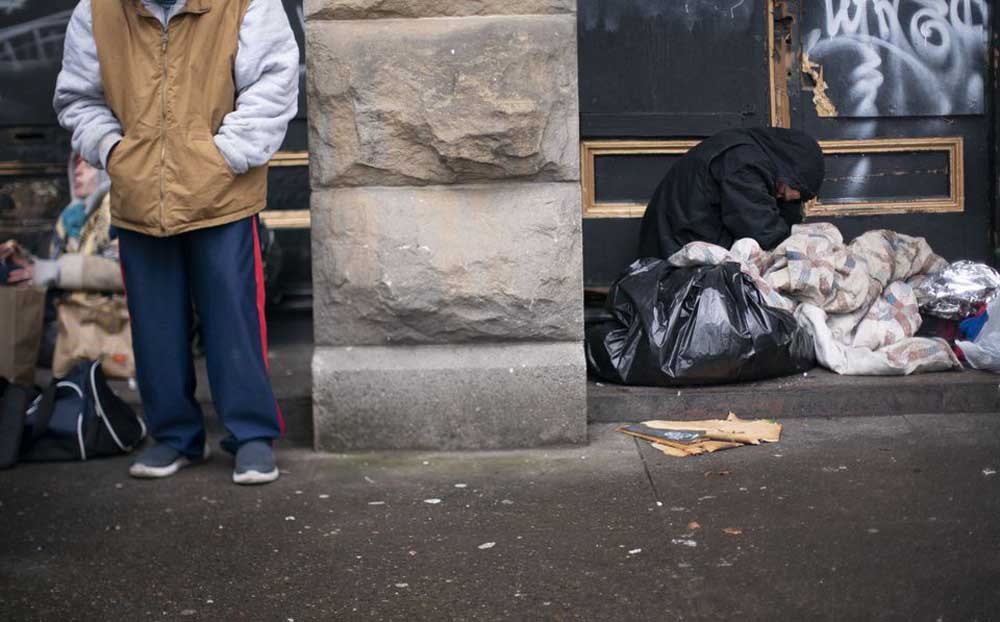Oregon lawmakers floating proposal to recriminalize minor drug possession to ‘fix’ Measure 110
Published 4:00 pm Thursday, January 11, 2024

- Oregon lawmakers have discussed a proposal to make possession of small amounts of illegal drugs a crime, as it was before voters approved Measure 110 in 2020.“Insecurity and uncertainty are the general feeling down here,” said William Jarman, 61, left, as he stood outside the historic Concord building on SW Harvey Milk Street and Second Avenue in downtown Portland. April 12, 2023
Oregon lawmakers are discussing a proposal to recriminalize minor drug possession, a move that would gut the most controversial part of Oregon’s voter-approved drug law.
Multiple people briefed on the proposal say Senate Majority Leader Kate Lieber and Rep. Jason Kropf, co-chairs of a special committee tasked with addressing shortcomings of Measure 110 and the state’s behavioral health system, have held meetings in the past two weeks to unveil a slate of policy proposals.
Trending
Those include elevating minor drug possession from a violation on par with a traffic ticket to a low-level misdemeanor crime, according to several sources familiar with the discussions who spoke on condition of anonymity because the proposal is in early stages.
The interim committee has held a series of hearings to lay the groundwork for the 2024 session.
The Joint Interim Committee on Addiction and Community Safety Response Committee met Wednesday but did not address the proposals. Kropf, a Bend Democrat, announced that lawmakers would unveil their recommendations before the session begins next month.
Making possession of small amounts of fentanyl, heroin, methamphetamine and other street drugs a crime again is part of a suite of policies the committee is expected to introduce.
The proposal regarding drug possession creates multiple chances for people to get treatment help after an arrest: before being booked into jail and before they enter a plea. They would also be candidates for diversion if they end up being prosecuted. One provision under consideration would expunge the conviction.
Lieber, a Beaverton Democrat, declined to comment, saying discussions about the proposal are preliminary.
Trending
Tera Hurst, executive director of the Oregon Health Justice Recovery Alliance, a coalition of state and national groups that supported Measure 110, including the New York-based Drug Policy Alliance, said she attended recent meetings where Lieber presented the proposal. The Drug Policy Alliance helped fund the campaign for the ballot measure.
Hurst’s organization helped organize a trip to Portugal last year for lawmakers and others to see how the southern European country approaches decriminalization. Lieber joined the trip but paid her own way.
Hurst called the potential rollback of Measure 110 “heartbreaking.”
“It’s not going to make an impact on the problem,” she said. “It’s not going to solve the problem they are trying to solve. It’s going to create more harm to communities who are struggling with addiction and who have been targeted by law enforcement and the criminal justice system for decades.”
Mae Lee Browning, a lobbyist for the Oregon Criminal Defense Lawyers Association, said she too was briefed on the proposal. She said recriminalizing drugs doesn’t address the proliferation of public use in Portland.
Drug possession, she said, “doesn’t seem to be the problem. It seems to be a Portland-centric problem, and the problem there is public use.”
Progressive organizations are lining up to defeat the proposal. They argue that criminalizing drug possession represents a return to the war on drugs and will only penalize people suffering from addiction.
“Voters decided in 2020 to approach our overdose crisis as a public health crisis and not a carceral one,” said Meredith Wadlington, a policy coordinator at Unite Oregon, a group whose stated mission is building a “unified intercultural movement for justice.”
Keely Nguyen, a spokesperson for Partnership for Safety & Justice, which advocates for criminal justice reform, said already the state cannot meet demand for treatment and services.
“Adding criminal penalties and jail will make recovery more difficult,” she said.
Lawmakers face pressure to act. Public support for Measure 110 has plunged as Oregon confronts unchecked public fentanyl use and rising overdose rates. A coalition of political, civic and business leaders last fall announced a push for two voter initiatives they say would “fix and improve” the law, which passed with overwhelming voter support in 2020.
Backers of that effort so far have raised about $703,000, according to Oregon Secretary of State campaign finance records.
Washington County District Attorney Kevin Barton, who is part of the political effort to roll back decriminalization, said the legislative proposal doesn’t go far enough.
He supports making minor drug possession the highest-level misdemeanor, allowing the criminal justice system to have the time and “tools” to compel people to stay in treatment.
“It’s moving in the right direction,” Barton said. “I don’t think it’s 100% where it needs to be.”
Rep. Kevin Mannix, R-Salem, said he supports the concept but, like Barton, thinks it needs to be tougher. The proposal calls for making low-level drug possession the lowest misdemeanor, which he said “doesn’t give any leverage or opportunity for any negotiations as to a reduced charge with prosecutors.”
A Class C misdemeanor carries a penalty of up to 30 days in jail. A Class B carries up to 60 days, and a Class A is up to a year.
“I think the amount of criminal penalty needs to be discussed,” he said, “so there is more flexibility and opportunity to intervene if needed.”
Portland State University researchers recently released their latest findings as part of a three-year study to examine the impact of decriminalization, saying it’s too soon to draw definitive conclusions about the long-term impact of the law.
They found the law has not impacted violent crime rates and that Oregon’s rising rates of fatal overdoses began before the pandemic. They also found that the criminal justice system is not a “strong conduit” for getting people into treatment.
They recommended that policymakers increase coordination between police and providers and boost community outreach and connections to Measure 110-funded programs, as well as examine programs that increase youth prevention and access to medications that help treat opioid addiction.
The researchers advised against recriminalization, saying the previous system failed to connect significant numbers of people with treatment.
“If the Legislature chooses to criminalize public drug use, they should consider methods of ensuring such convictions and consequences do not create long-lasting systemic, and reverberating harm on individuals with substance use disorder,” they said.








